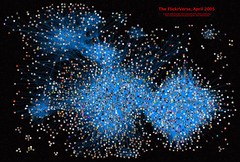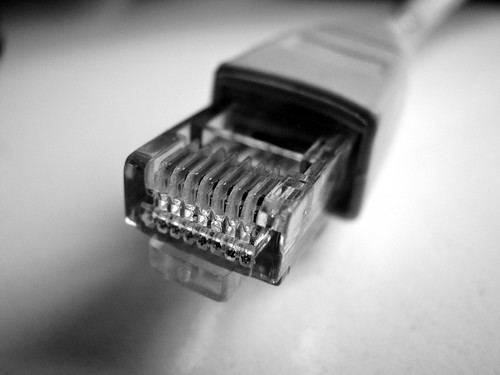 Chris Saad wrote a good post on the DataPortability Project’s (DPP) blog about how the web works on a peering model. Something we do at the DPP is closely monitor the market’s evolution, and having done this actively for a year now as a formal organisation, I feel we are at the cusp of a lot more exciting times to come. These are my thoughts on why Facebook needs to alter their strategy to stay ahead of the game, and by implication, everyone else who is trying to innovate in this sphere.
Chris Saad wrote a good post on the DataPortability Project’s (DPP) blog about how the web works on a peering model. Something we do at the DPP is closely monitor the market’s evolution, and having done this actively for a year now as a formal organisation, I feel we are at the cusp of a lot more exciting times to come. These are my thoughts on why Facebook needs to alter their strategy to stay ahead of the game, and by implication, everyone else who is trying to innovate in this sphere.
Let’s start by describing the assertion that owning data is useless, but access is priceless.
It’s a bold statement that you might need to get some background reading to understand my point of view (link above). However once you understand it, all the debates about who “owns” what data, suddenly become irrelevant. Basically access, just like ownership, is possible due to a sophisticated society that recognises peoples rights. Our society has now got to the point where ownership matters less now for the realisation of value, as we now have things in place to do more, through access.
Accessonomics: where access drives value
Let’s use an example to illustrate the point with data. I am on Facebook, MySpace, Bebo, hi5, Orkut, and dozens of other social networking sites that have a profile of me. Now what happens if all of those social networking sites have different profiles of me? One when I was single, one when I was in a relationship, another engaged, and another “it’s complicated”.
If they are all different, who is correct? The profile I last updated of course. With the exception of your birthdate, any data about you will change in the future. There is nothing ‘fixed’ about someone and “owning” a snap shot of them at a particular point of time, is exactly that. Our interests change, as do our closest friends and our careers.
Recognising the time dimension of information means that unless a company has the most recent data about you, they are effectively carrying dead weight and giving themselves a false sense of security (and a false valuation). Facebook’s $3 billion market value is not the data they have in June 2008; but data of people they have access to, of which, that’s the latest version. Sure they can sell to advertisers specific information to target ads, but “single” in May is not as valuable as “single” in November (and even less valuable than single for May and November, but not the months in between).

Facebook Connect and the peering network model
The announcement by Facebook in the last month has been nothing short of brilliant (and when its the CEO announcing, it clearly flags it’s a strategic move for their future, and not just some web developer fun). What they have created out of their Facebook Connect service is shaking up the industry as they do a dance with Google since the announcement of OpenSocial in November 2007. That’s because what they are doing is creating a permanent relationship with the user, following them around the web in their activities. This network business model means constant access to the user. But the mistake is equating access with the same way as you would with ownership: ownership is a permanent state, access is dependent on a positive relationship – the latter of course, being they are not permanent. When something is not permanent, you need strategies to ensure relevance.
When explaining data portability to people, I often use the example of data being like money. Storing your data in a bank allows you better security to house that data (as opposed to under your mattress) and better ability to reuse it (ie, with a theoretical debit card, you can use data about your friends for example, to filter content on a third party site). This Facebook Connect model very much appears to follow this line of thinking: you securely store your data in one place and then you can roam the web with the ability to tap into that data.
However there is a problem with this: data isn’t the same as money. Money is valuable because of scarcity in the supply system, whilst data becomes valuable from reusing and creating derivatives. We generate new information by connecting different types of data together (which by definition, is how information gets generated). Our information economy allows alchemists to thrive, who can generate value through their creativity of meshing different (data) objects.
By thinking about the information value chain, Facebook would benefit more by being connected to other hubs, than having all activity go through it. Instead of data being stored in the one bank, it’s actually stored across multiple banks (as a person, it probably scares you to store all your personal information with the one company: you’d split it if you could). What you want to do as a company is have access to this secure EFT ecosystem. Facebook can access data that occurs between other sites because they are party to the same secured transfer system, even though they had nothing to do with the information generation.
Facebook needs to remove itself from being a central node, and instead, a linked-up node. The node with the most relationships with other sites and hubs wins, because with the more data at your hands, the more potential you have of connecting dots to create unique information.
Facebook needs to think like the Byzantines
A lot more can be said on this and I’m sure the testosterone within Facebook thinks it can colonise the web. What I am going to conclude with is that that you can’t fight the inevitable and this EFT system is effectively being built around Facebook with OpenSocial. The networked peer model will trump – the short history and inherent nature of the Internet proves that. Don’t mistake short term success (ie, five years in the context of the Internet) with the long term trends.
 There was once a time where people thought MySpace was unstoppable. Microsoft unbeatable. IBM unbreakable. No empire in the history of the word has lasted forever. What we can do however, is learn the lessons of those that lasted longer than most, like the forgotten Byzantine empire.
There was once a time where people thought MySpace was unstoppable. Microsoft unbeatable. IBM unbreakable. No empire in the history of the word has lasted forever. What we can do however, is learn the lessons of those that lasted longer than most, like the forgotten Byzantine empire.
Also known as the eastern Roman empire, its been given a separate name by historians because it outlived its western counterpart by over 1000 years. How did they last that long? Through diplomacy and avoiding war as much as possible. Rather than buying weapons, they bought friends, and ensured they had relationships with those around them who had it in their self-interest to keep the Byzantines in power.
Facebook needs to ensure it stays relevant in the entire ecosystem and not be a barrier. They are a cashed up business in growth mode with the potential to be the next Google in terms of impact – but let’s put emphasis on “potential”. Facebook has competitors that are cash flow positive, have billions in the bank, but most importantly of all are united in goals. They can’t afford to fight a colonial war of capturing people identity’s and they shouldn’t think they need to.
Trying to be the central node of the entire ecosystem, by implementing their own proprietary methods, is an expensive approach that will ultimately be beaten one day. However build a peered ecosystem where you can access all data is very powerful. Facebook just needs access, as they can create value through their sheer resources to generate innovative information products: that, not lock-in, is that will keep them up in front.
Just because it’s a decentralised system, doesn’t mean you can’t rule it. If all the kids on a track are wearing the same special shoes, that’s not going to mean everyone runs the same time on the 100 metre dash. They call the patriarch of Constantiniple even to this day “first among equals” – an important figure who worked in parallel to the emperor’s authority during the empire’s reign. And it’s no coincidence that the Byzantine’s outlived nearly all empires known to date, which even to this day, arguably still exists in spirit.
Facebook’s not going to change their strategy, because their short-term success and perception of dominance blinds their eyes. But that doesn’t mean the rest of us need to make that mistake. Pick your fights: realise the business strategy of being a central node will create more heart-ache than gain.
It may sound counter intuitive but less control can actually mean more benefit. The value comes not from having everyone walk through your door, but rather you having the keys to everyone else’s door. Follow the peered model, and the entity with the most linkages with other data nodes, will win.
